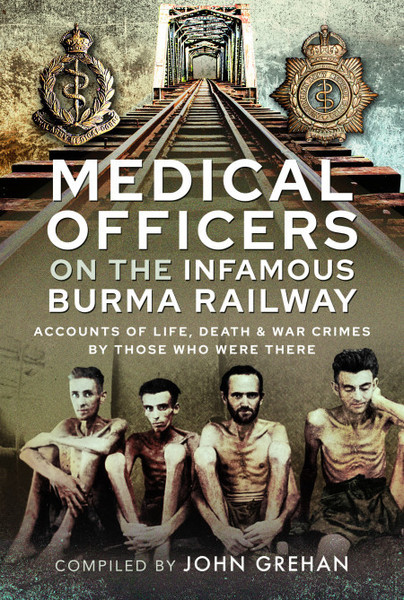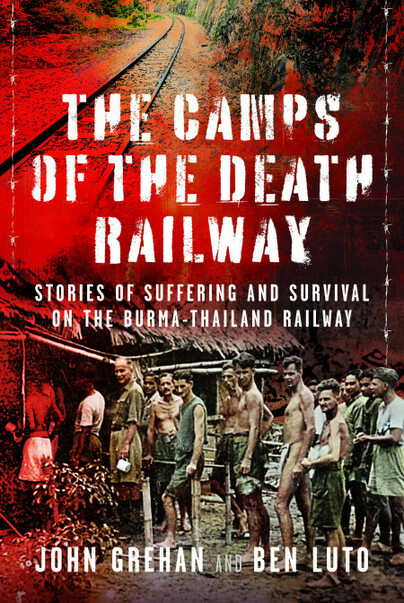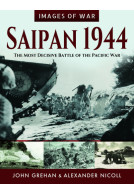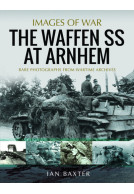Medical Officers on the Infamous Burma Railway (Hardback)
Accounts of Life, Death and War Crimes by Those Who Were There With F-Force
(click here for international delivery rates)
Need a currency converter? Check XE.com for live rates
| Other formats available - Buy the Hardback and get the eBook for £1.99! | Price |
|---|---|
| Medical Officers on the Infamous… ePub (10.6 MB) Add to Basket | £6.99 |
In 1944, a compilation of medical reports from the main prisoner of war work camps along the infamous Thailand-Burma railway was submitted to General Arimura Tsunemichi, commander of the Japanese Prisoner of War Administration. The authors stated that the reports were neither complaints nor protests, but merely statements of fact. The prisoners received only one reply – that all copies of the documents must be destroyed. As one officer later recalled, ‘Of course, this was not done’ and copies of these reports survived, stored away in dusty files, for future generations to learn the truth.
Work on the railway began in June 1942, the Japanese using mainly forced civilian labour as well as some 12,000 British and Commonwealth PoWs. Such is well-known. So are the stories of ill-treatment and brutality, many of which have been published. The vast majority of these accounts, however, were written after the war, coloured by the sufferings the men had endured. The reports presented here are quite unique, for they were written by the medical officers in the camps as the events they describe were unfolding before their eyes.
The health and well-being of the PoWs was the medical officers’ primary concern, and these reports enable us to learn exactly how the men were treated, fed and cared for in unprecedented detail. There are no exaggerated tales or false memories here, merely facts, shocking and disturbing though they may be. We learn how the medical officers organised their hospitals and dealt with the terrible diseases, beatings and malnutrition the men endured. As the compilers of the reports state, 45 per cent of the men under their care died in the course of just twelve months.
But equally, we find that the prisoners did have a voice and had the facilities, and the courage, to write and submit such reports to the Japanese, perhaps contradicting some of the long-held beliefs about conditions in the camps. Through the words of the Medical Officers themselves, some of the detail of what really happened on the Death Railway, for good or ill, is revealed here.
This release from Front Line Books is an unusual release, in that it tells the story in a very matter of fact way and covers the suffering of the PoW's under the Imperial Japanese Army. One aspect that surprised me was that a number of the medical reports contain information, such as the fact that the Imperial Japanese forces were open to communication with medical officers and did make attempts to obtain the treatments and medications requested by the medical officers and it tended to be the forces not directly engaged with the control of the PoW's that did not supply these items.
Armorama
Read the full review here
About John Grehan
JOHN GREHAN has written, edited or contributed to more than 300 books and magazine articles covering a wide span of military history from the Iron Age to the recent conflict in Afghanistan. John has also appeared on local and national radio and television to advise on military history topics. He was employed as the Assistant Editor of Britain at War Magazine from its inception until 2014. John now devotes his time to writing and editing books.
The Camps of the Death Railway Stories of Suffering and Survival on the Burma-Thailand Railway (Hardback)
As the terrible conditions experienced by the British, Australian, Dutch, and American PoWs in the building of railway linking Buma and Thailand became known, as well as the appalling atrocities the men suffered at the hands of the Japanese, it was clear that an investigation would have to be undertaken. Before war trials began, the Japanese submitted their account of the building of the railway, which is presented here. What is also presented are the stories from the prisoners themselves from each of the camps, telling in stark, unflinching detail what really happened to them. Drawn entirely…
By John Grehan, Ben LutoClick here to buy both titles for £34.99























